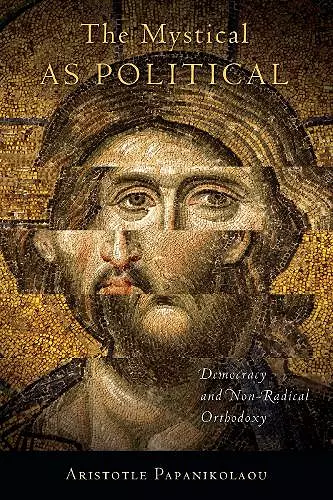The Mystical As Political
Format:Paperback
Publisher:University of Notre Dame Press
Published:30th Oct '12
Currently unavailable, and unfortunately no date known when it will be back

Theosis, or the principle of divine-human communion, sparks the theological imagination of Orthodox Christians and has been historically important to questions of political theology. In The Mystical as Political: Democracy and Non-Radical Orthodoxy, Aristotle Papanikolaou argues that a political theology grounded in the principle of divine-human communion must be one that unequivocally endorses a political community that is democratic in a way that structures itself around the modern liberal principles of freedom of religion, the protection of human rights, and church-state separation.
Papanikolaou hopes to forge a non-radical Orthodox political theology that extends beyond a reflexive opposition to the West and a nostalgic return to a Byzantine-like unified political-religious culture. His exploration is prompted by two trends: the fall of communism in traditionally Orthodox countries has revealed an unpreparedness on the part of Orthodox Christianity to address the question of political theology in a way that is consistent with its core axiom of theosis; and recent Christian political theology, some of it evoking the notion of "deification," has been critical of liberal democracy, implying a mutual incompatibility between a Christian worldview and that of modern liberal democracy.
The first comprehensive treatment from an Orthodox theological perspective of the issue of the compatibility between Orthodoxy and liberal democracy, Papanikolaou's is an affirmation that Orthodox support for liberal forms of democracy is justified within the framework of Orthodox understandings of God and the human person. His overtly theological approach shows that the basic principles of liberal democracy are not tied exclusively to the language and categories of Enlightenment philosophy and, so, are not inherently secular.
". . . Aristotle Papanikolaou engages Orthodox tradition, a persistent Eastern suspicion of Western values, and contemporary Western theological assertions that liberal democracy is anathema to a eucharistic understanding of church. . . This book is a model for how a scholar can be critical, careful, and even generous in his disagreements." —Horizons
"Drawing on a wide range of historical source and contemporary political theology, [Papanikolaou] offers a fresh and constructive overview of the relationship between Orthodox Christianity and the political realm. Papanikolaou's book makes a welcome contribution to the debate on the significance of symphonia in contemporary politics." —Religion, State and Society
"Aristotle Papanikolaou's The Mystical as Political is a welcome contribution to discussions concerning Christian political theology in particular and the role of religion in the contemporary context more generally. His 'non-radical Orthodoxy' supports critical engagement with modern liberal democracies on the basis of the church's mission to persuade human beings to enter freely into communion with God." —Journal of Religion
"This recent work by Aristotle Papanikolaou . . . is a profound achievement in political theology. Papanikolaou's work fills a great void in Orthodox Christian studies as well as political theology. . . . What I find particularly helpful in this work is his positive appreciation of liberal democracy and human rights from an Orthodox Christian perspective, which many Orthodox prelates and theologians simply find incompatible with their faith tradition." —Journal of Church and State
"Papanikolaou has written an excellent and timely book. . . . [His] narrative is fascinating and his argumentation sharp and carefully balanced. Well versed in both Eastern and Western theology, he is therefore able to bring together insights from both traditions into fruitful dialogue." —Theology
"The Mystical as Political may be the theological equivalent of a venus flytrap. It has the potential to draw multiple interests and points of view into a conversation about the kinds of politics theosis demands. So rather than an indestructible apologia for liberal democracy, Papanikolaou has given us something more engaging, and thus, according to his own stated intentions, more successful." —Modern Theology
"The Mystical as Political is an important contribution to conversations on Orthodoxy, theology, and politics, written in response to the underdeveloped voice of Orthodoxy in law and politics. . . . This timely, constructive book will generate much reflection, discussion, and debate in Orthodox circles. For those interested in the intrinsic connections between mystical theology and politics, this book is essential reading." —Anglican Theological Review
"It is, indeed, essential reading and puts forward a challenging and uncompromising affirmation of human dignity, personhood, and politics colored by the light of the Orthodox concept of divine-human communion, while admirably endeavoring not to confuse the ecclesial with the political nor neglect the ascetic and relational reality of human community and love." —Journal of Markets and Morality
"Historically informed, critically agile, and most likely bar-setting for future treatments of what a twenty-first century Orthodox political theology may look like." —Sobornost
"Papanikolaou's The Mystical as Political is a welcome addition to current debates in political theology. His emphasis on the importance of theosis or divine-human communion marks a distinct contribution that should appeal to students and researchers interested in the relationship between theology and politics and the role that Orthodox thought can and should play in current and future discussions." —Religion and Theology
"Papanikolaou definitely presents an Orthodox theology that is attuned to the wider issues facing believers in the contemporary world. . . .This alone is of merit in the midst of many contemporary Orthodox attitudes." —Red Egg Review
ISBN: 9780268038960
Dimensions: 229mm x 152mm x 14mm
Weight: 372g
248 pages